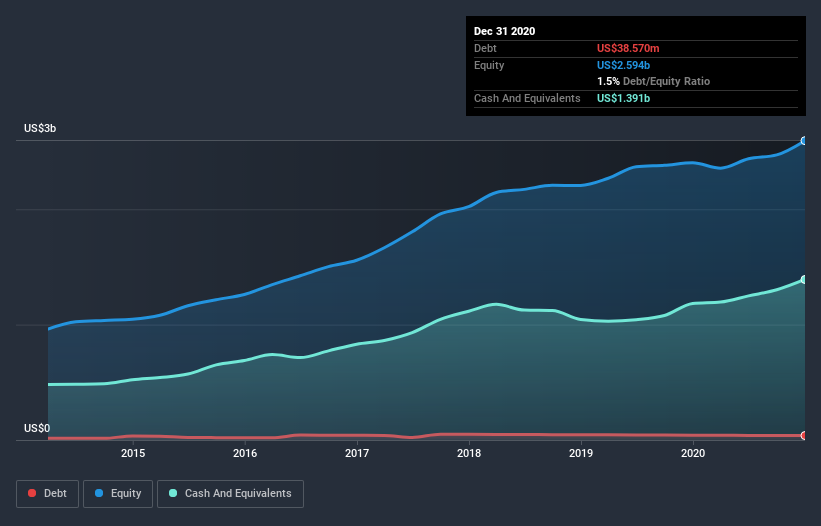We Think IPG Photonics (NASDAQ:IPGP) Can Stay On Top Of Its Debt
Warren Buffett famously said, 'Volatility is far from synonymous with risk.' So it might be obvious that you need to consider debt, when you think about how risky any given stock is, because too much debt can sink a company. As with many other companies IPG Photonics Corporation (NASDAQ:IPGP) makes use of debt. But should shareholders be worried about its use of debt?
What Risk Does Debt Bring?
Debt assists a business until the business has trouble paying it off, either with new capital or with free cash flow. In the worst case scenario, a company can go bankrupt if it cannot pay its creditors. However, a more frequent (but still costly) occurrence is where a company must issue shares at bargain-basement prices, permanently diluting shareholders, just to shore up its balance sheet. Of course, debt can be an important tool in businesses, particularly capital heavy businesses. The first step when considering a company's debt levels is to consider its cash and debt together.
Check out our latest analysis for IPG Photonics
How Much Debt Does IPG Photonics Carry?
As you can see below, IPG Photonics had US$38.6m of debt at December 2020, down from US$41.7m a year prior. But on the other hand it also has US$1.39b in cash, leading to a US$1.35b net cash position.
How Healthy Is IPG Photonics' Balance Sheet?
We can see from the most recent balance sheet that IPG Photonics had liabilities of US$214.6m falling due within a year, and liabilities of US$127.0m due beyond that. On the other hand, it had cash of US$1.39b and US$273.3m worth of receivables due within a year. So it actually has US$1.32b more liquid assets than total liabilities.
This short term liquidity is a sign that IPG Photonics could probably pay off its debt with ease, as its balance sheet is far from stretched. Succinctly put, IPG Photonics boasts net cash, so it's fair to say it does not have a heavy debt load!
It is just as well that IPG Photonics's load is not too heavy, because its EBIT was down 20% over the last year. When a company sees its earnings tank, it can sometimes find its relationships with its lenders turn sour. There's no doubt that we learn most about debt from the balance sheet. But it is future earnings, more than anything, that will determine IPG Photonics's ability to maintain a healthy balance sheet going forward. So if you're focused on the future you can check out this free report showing analyst profit forecasts.
But our final consideration is also important, because a company cannot pay debt with paper profits; it needs cold hard cash. IPG Photonics may have net cash on the balance sheet, but it is still interesting to look at how well the business converts its earnings before interest and tax (EBIT) to free cash flow, because that will influence both its need for, and its capacity to manage debt. Over the most recent three years, IPG Photonics recorded free cash flow worth 60% of its EBIT, which is around normal, given free cash flow excludes interest and tax. This cold hard cash means it can reduce its debt when it wants to.
Summing up
While it is always sensible to investigate a company's debt, in this case IPG Photonics has US$1.35b in net cash and a decent-looking balance sheet. So we don't have any problem with IPG Photonics's use of debt. There's no doubt that we learn most about debt from the balance sheet. But ultimately, every company can contain risks that exist outside of the balance sheet. For example - IPG Photonics has 1 warning sign we think you should be aware of.
When all is said and done, sometimes its easier to focus on companies that don't even need debt. Readers can access a list of growth stocks with zero net debt 100% free, right now.
This article by Simply Wall St is general in nature. It does not constitute a recommendation to buy or sell any stock, and does not take account of your objectives, or your financial situation. We aim to bring you long-term focused analysis driven by fundamental data. Note that our analysis may not factor in the latest price-sensitive company announcements or qualitative material. Simply Wall St has no position in any stocks mentioned.
Have feedback on this article? Concerned about the content? Get in touch with us directly. Alternatively, email editorial-team (at) simplywallst.com.

 Yahoo News
Yahoo News 

